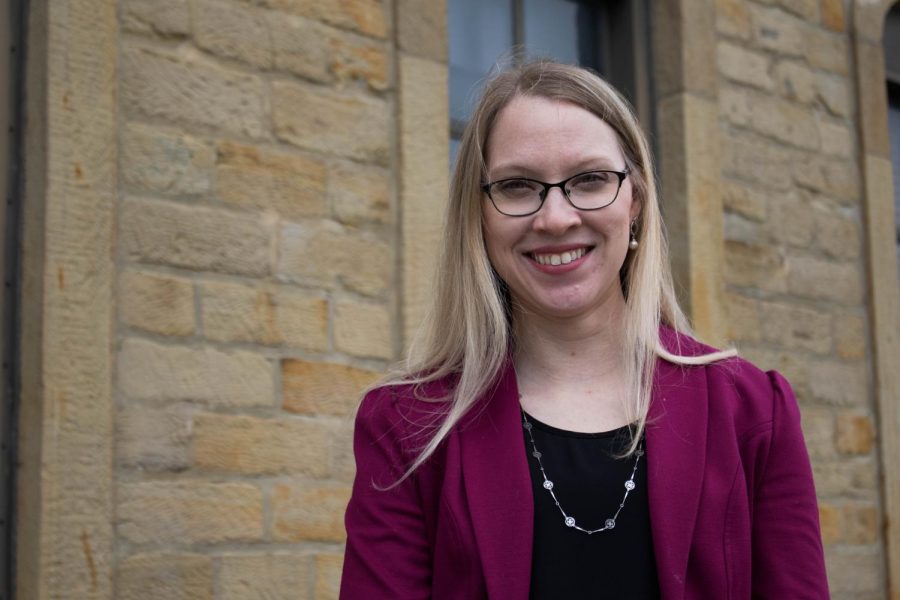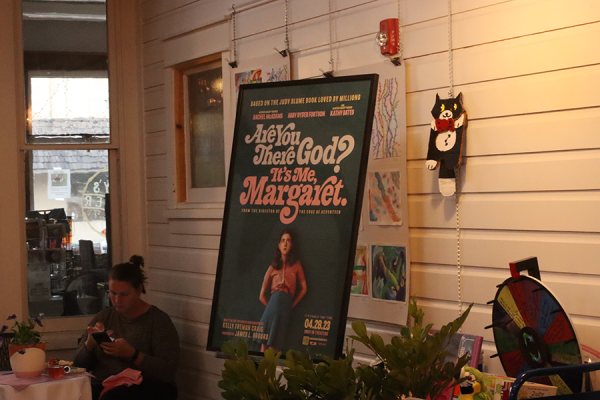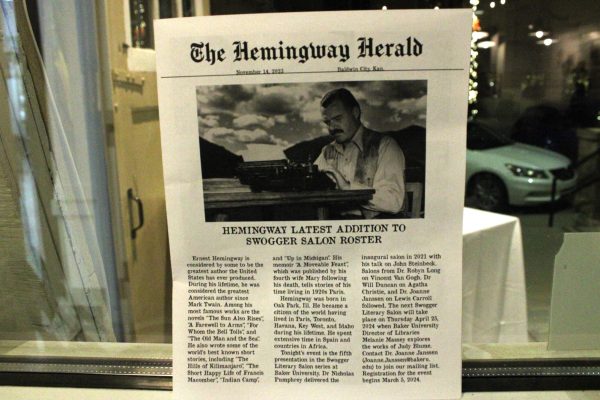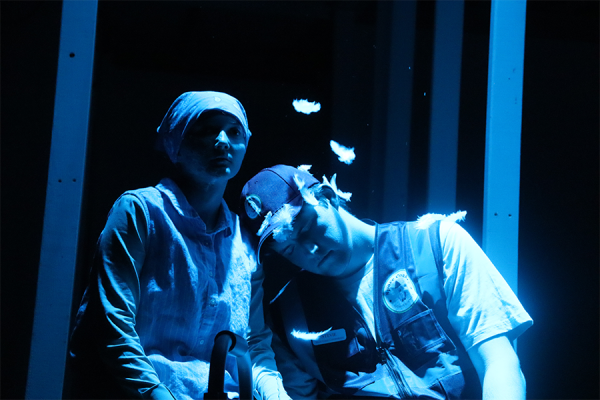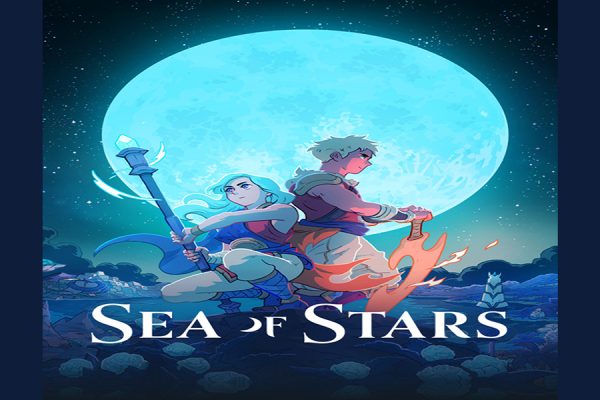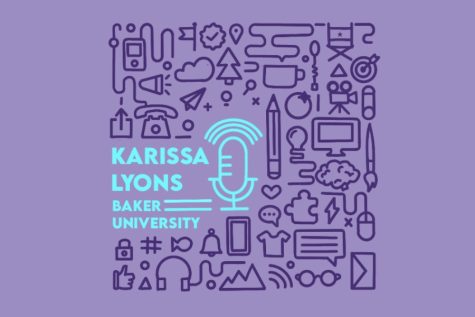Theater professor preps students for the “real world”
Emily Kasprzak began teaching at Baker in the fall of 2018 and is currently teaching Musical Theater Dance and Costuming and Make Up
It is not uncommon for recent college graduates to feel clueless on how to enter the professional world, especially those seeking careers in the arts. Assistant Theater Professor Emily Kasprzak decided to focus on preparing her theater students to seamlessly enter their respective fields with her class this semester, Auditioning 300.
The Mission
The term “audition” is usually associated with delivering a monologue or performing a short musical excerpt in front of a casting director. However, this being Kasprzak’s first time teaching Auditioning 300, she wanted her class to be much more than acing an audition.
“If I’m gonna be honest, my first thought was, ‘that would be really boring, to spend an entire semester just doing monologues.’ I felt like it would end up being a really repetitive class,” Kasprzak said.
She started thinking about the purpose of auditioning: to get jobs. She analyzed the current theater curriculum and found no class specifically geared towards assisting theater majors with applying and searching for careers. This caused Kasprzak to reflect on her own experience after graduating from Emporia State University.
“When I graduated with my Bachelor’s, I felt like I did not know what the next step was. I knew that you go and do monologues to audition for jobs, but I did not know any of the other factors,” Kasprzak said.
That is when Kasprzak decided the direction she wanted for Auditioning 300.
“I thought this class should be about opportunities available with a theater degree, how to get those jobs, and exposing students to all of the different lines of work involved in theater or theater adjacent,” Kasprzak said.
Workshops
The curriculum for Auditioning 300 contains several different lessons and activities, many of which are taught through interactive workshops.
The first workshop, of course, was how to deliver a monologue. The students jumped right in, delivering their first monologue on the second day of class. Kasprzak provided initial feedback, lectured on the proper way to give a monologue, and demonstrated all of her points by performing one for the class. The students delivered their monologues again to a partner and tried to apply what they learned in lecture.
Other acting workshops exposed the students to the different parts of an audition, such as cold reads with scene partners and film reels for television auditions. This way, they will not feel unprepared at a future audition if asked to perform on camera or with a partner after only having a few minutes to read the scene.
According to her students, one of the most helpful workshops in Auditioning 300 was learning how to craft a portfolio. Kasprzak highlighted the essential components of an artistic job application: resume, cover letter, artistic philosophy statement and website. She broke each criteria down, describing the information and proper format required for each. She also provided examples of these components for the students to use as a reference.
Sophomore theater major Barry Baker has enjoyed refining his skills through Kasprzak’s workshops, especially those focused on the artistic portfolio.
“I think the workshops have been my favorite part, because it’s helped build on the knowledge I already had,” Baker said.
For the final, each student will apply all of the knowledge acquired from the workshops by submitting a complete portfolio and performing a polished monologue at a simulated audition.
Interviews
Besides workshops, the other predominate portion of Auditioning 300 is dedicated to interviewing professionals in theater and learning from their first-hand experiences.
As Kasprzak formed the syllabus and lesson plans last fall, she said she wanted to expose her class to the diversity of professions in theater, so she posted on Facebook asking if anyone would be interested in speaking with her students. After receiving over 50 responses, Kasprzak selected specific individuals she connected with through the master’s of fine arts program at Michigan State University and community theaters in Michigan and Kansas City.
“I tried to pick the people who were in different fields, and […] in New York, Chicago and LA,” Kasprzak said.
The students gathered in the sound booth of Rice Auditorium and observed a Skype interview between Kasprzak and the guest speaker, as she asked about their educational background, current profession and how they obtained it, and the theater scene of their location. At the end of each interview, the students had an opportunity to ask their own questions directly to the guest.
So far this semester, they have interviewed professional actors such as Andy Huff, an original cast member of the off-Broadway play, “Puffs,” and Chris Robinson, a full-time character actor at Universal Studios.
Besides actors, the class spoke with Brandon Piper, who is an account director for Civic Entertainment Group, an experiential marketing agency owned by Ryan Seacrest in New York City. They also reached out to Wes Haskell, a company manager for the Lincoln Center in New York City. On the day of their interview, Haskell was preparing for a charity event in which actor Lin Manuel-Miranda was set to perform and former presidential candidate Hillary Clinton was planning to attend.
In addition to group interviews, each student was assigned to interview an expert in their desired career via phone. For students like Baker, these interviews gave important insights on what they should expect if they pursue the same path.
“I interviewed a professional stage manager in Michigan […] she explained what her daily life is like, which gave me an idea of what my life would be like,” Baker said.
The students even got to interact with experts in person. Zach Faust, 22, founded Faust Theater, a for-profit theater in Kansas City, instead of attending college. Recently, the class took a field trip to Harvest Productions, a company that is responsible for scenic design and audio/visual installations for many organizations like the Kansas City Symphony and the Power and Light District. Baker alum and CEO of Harvest Susan Surman gave the students a personal tour as she unknowingly demonstrated the value of a Baker theater degree.
Looking Forward
While Kasprzak intends on maintaining the same overarching goal of preparing students with Auditioning 300, she plans on changing a few aspects and revamping others. For example, while the interviews have been a central part of the curriculum, asking someone to dedicate an hour out of their busy schedule is a big request, according to Kasprzak. She hopes to teach some of the wisdom gained through the interviews in a lecture format, using the notes she has taken each time.
“I want to continue to have guest artists come to our class and talk to us, but also using the notes from this year will be helpful,” Kasprzak said.
Kasprzak also wants to incorporate more hands-on experiences such as taking trips to places like Harvest and local theaters to show what opportunities are students can take advantage of in the immediate area. She also hopes to strengthen certain areas in the curriculum like acting for television and film, as she believes she barely scratched the surface.
“I think the foundation of the class will remain the same, but we will find different areas where we can swap in something if we can’t do the same exact thing [next year],” Kasprzak said.
For sophomore theater major Dani Holland, this class has displayed an abundance of opportunities available to them with their degree, creating a sense of security and confidence.
“It’s been a fear for everyone in my life when I’ve told them I’m doing theater, [saying] ‘Well, what are you going to do with a theater degree?’ and this [class] has shown me you can do a lot with a theater degree actually, if you put your mind to it,” Holland said.
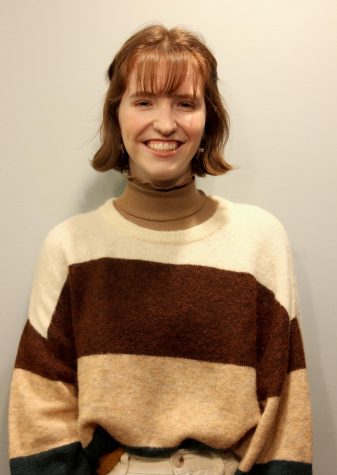
Isabel Ashley is a junior from Topeka, Kansas. She is studying Mass Media and is the news intern for Kansas Public Radio. Her interests include fashion,...


